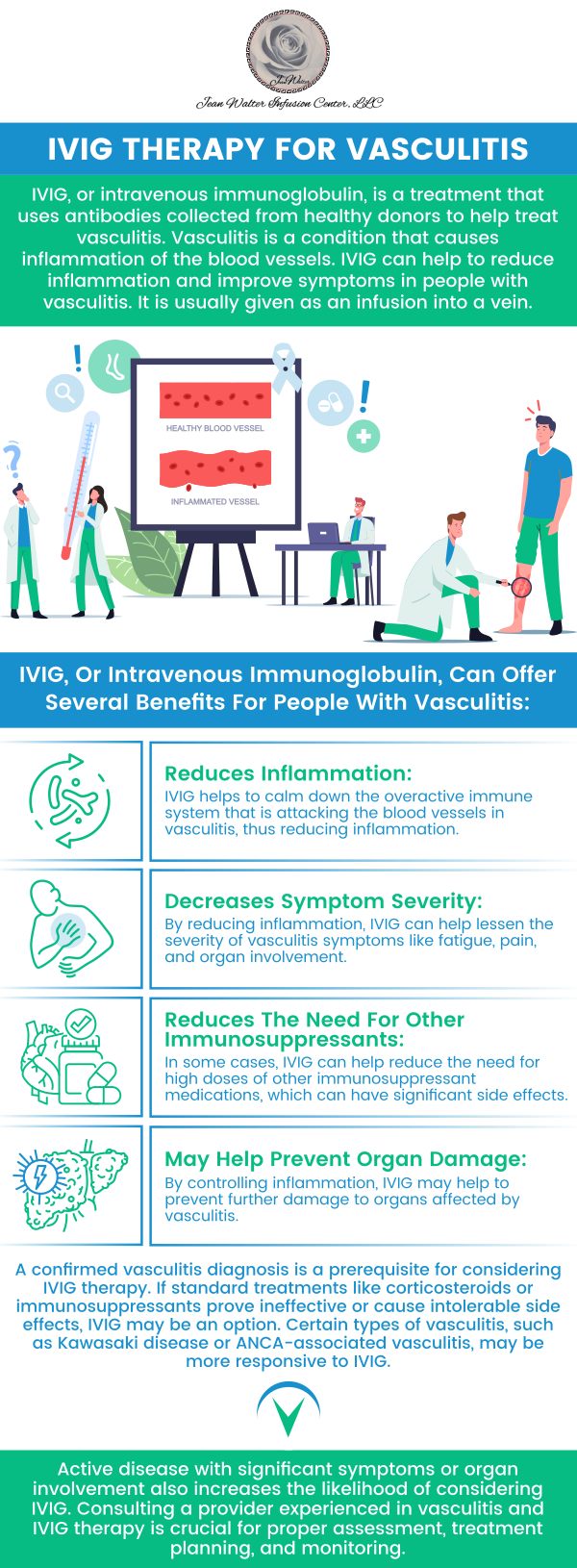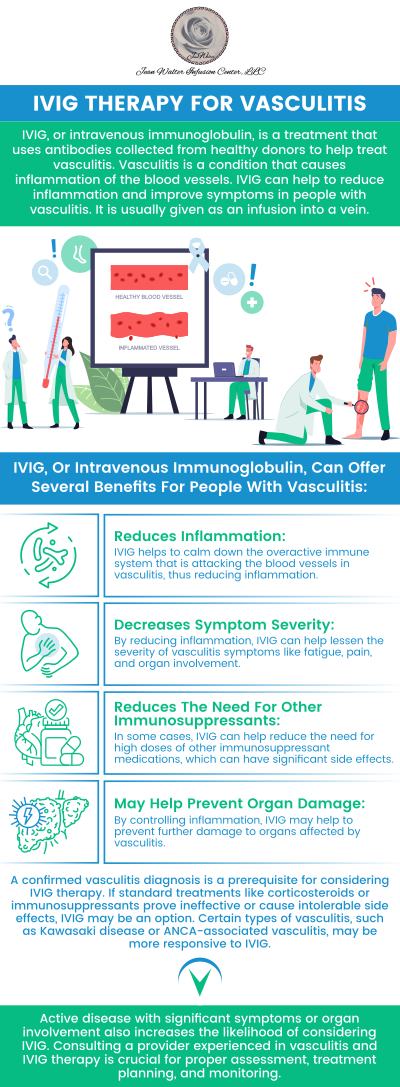What Is Intravenous Immunoglobulin Infusion Therapy for Vasculitis?
When a patient has both an infection and active vasculitis, IVIG is most frequently utilized to treat the condition. IVIG does not weaken the immune system and makes it easier to recover from infections, unlike the majority of other medications used to treat vasculitis. If you are looking for vasculitis treatment then visit Jean Walter Infusion Center, our board-certified doctor Dr. Nasser Nasseri, MD provides safe and effective intravenous immunoglobulin therapy for treating vasculitis. For more information, contact us or book an appointment online. We have convenient locations to serve you in Edgewater MD, Rosedale MD, North Baltimore MD, Columbia MD, Glen Burnie MD, and Catonsville MD.




Table of Contents:
What is the main cause of vasculitis?
How does IVIG treat vasculitis?
What are the advantages of intravenous immunoglobulin?
How long does IVIG take to reduce inflammation?
Manage Vasculitis with Intravenous Immunoglobulin (IVIG) Therapy at Jean Walter Infusion Center
Vasculitis is a condition characterized by blood vessel inflammation. The condition can be triggered by various factors, including:
• Autoimmune disorders – Vasculitis is often caused by autoimmune diseases, where the immune system mistakenly attacks the body’s healthy tissues and organs. Examples of autoimmune disorders linked to vasculitis include rheumatoid arthritis, lupus, and Wegener’s granulomatosis.
• Infections – Certain infections, such as hepatitis B and C, HIV, and streptococcal infections, can lead to vasculitis. These infections can trigger an abnormal immune response, causing inflammation in the blood vessels.
• Certain medications – Some medications have been associated with the development of vasculitis as a rare side effect. Examples include certain antibiotics, nonsteroidal anti-inflammatory drugs (NSAIDs), and antiseizure medications.
• Environmental factors – Exposure to certain environmental factors, such as toxins, increases your risk of developing vasculitis.
Intravenous immunoglobulin (IVIG) is a breakthrough treatment option for vasculitis. IVIG contains antibodies derived from healthy donors and is administered through an intravenous (IV) infusion. IVIG supports vasculitis management in several ways, including:
• Immunomodulatory effects – IVIG contains a high concentration of antibodies to modulate and regulate the immune system. This helps suppress the abnormal immune response that contributes to the inflammation of blood vessels in vasculitis.
• Anti-inflammatory properties – IVIG has anti-inflammatory properties that reduce the severity and duration of vasculitis flare-ups. The treatment is effective for controlling inflammation within the blood vessels, which alleviates symptoms and prevents organ damage.
• Immune system support – The treatment provides a temporary boost to the immune system, which is very beneficial for managing vasculitis. IVIG strengthens the body’s defense mechanisms, making it better equipped to fight off infections and other triggers that worsen vasculitis.
• Platelet function improvement – Platelet function, which is important for proper blood clotting and preventing bleeding complications in certain types of vasculitis, can be improved by IVIG.
The exact dosage and duration of IVIG treatment depend on your specific symptoms and response to therapy.
Intravenous immunoglobulin (IVIG) offers numerous advantages as a treatment option. Some of the key benefits of IVIG therapy are:
• Rapid delivery – The treatment is administered intravenously, allowing for direct and rapid delivery into the bloodstream. This enables the antibodies to quickly reach their target sites throughout the body.
• Broad spectrum of coverage – IVIG contains a diverse range of antibodies derived from multiple donors. This broad spectrum of antibodies provides coverage against various infectious agents, making it effective against a wide range of immune-mediated diseases.
• Immunomodulatory effects – Intravenous immunoglobulin treatment has immunomodulatory effects, meaning it effectively regulates and balances the immune system. IVIG can alter the abnormal immune response and reduce excessive inflammation.
• Long-lasting benefits – IVIG has a prolonged half-life, so it remains in the body for an extended period. This allows for sustained immunomodulatory effects, reducing the frequency of treatments required.
• Well-tolerated – The treatment is generally well-tolerated with minimal side effects. Although serious adverse reactions are very rare, some individuals may experience mild infusion-related reactions such as headache, fever, or rash.
The length of time needed for intravenous immunoglobulin (IVIG) treatment to reduce vasculitis-related inflammation will vary depending on several factors. These factors include the individual’s response to treatment and the severity of the inflammation. In many cases, the effects of IVIG are noticeable shortly after the infusion, while in others, it may take several days or even weeks to observe significant improvements.
The immunomodulatory effects of IVIG gradually take effect as the antibodies used in the treatment interact with the immune system and modulate its response. It’s important to understand that IVIG is not an immediate solution to inflammation. Instead, it is a treatment that works overtime to gradually regulate and balance the immune system.
The healthcare provider who administers IVIG will closely monitor your response to treatment and adjust the dosage as needed. Regular follow-up appointments are recommended to assess your progress and determine the optimal frequency of IVIG therapy to effectively manage vasculitis.
Dr. Nasser Nasseri, MD, a board‑certified rheumatologist, specializes in the management of complex autoimmune conditions, including vasculitis. At Jean Walter Infusion Center, Dr. Nasseri combines his clinical expertise with advanced treatment options such as Intravenous Immunoglobulin (IVIG) Therapy, which is highly effective for managing inflammatory and immune‑related disorders. With his extensive training and experience in rheumatology, Dr. Nasseri tailors each treatment plan to meet the unique needs of his patients, ensuring that they receive the most effective care for their condition.
IVIG therapy at Jean Walter Infusion Center involves administering immunoglobulins — essential proteins that support the immune system — directly into the bloodstream. This therapy is particularly effective in treating vasculitis, as it helps reduce inflammation, regulate immune responses, and prevent further damage to blood vessels. Under Dr. Nasseri’s care, patients with vasculitis can expect a personalized approach to their treatment, with careful monitoring and adjustments to ensure optimal outcomes. Whether you’re managing chronic vasculitis or dealing with acute flare‑ups, Dr. Nasseri and his team are dedicated to helping you manage your condition and improve your quality of life. Intravenous immunoglobulin therapy is available at Jean Walter Infusion Center. For more information, contact us or book an appointment online. We have convenient locations to serve you in Maryland. We serve patients from Edgewater MD, Rosedale MD, North Baltimore MD, Columbia MD, Glen Burnie MD, Catonsville MD, Parkville MD, Middle River MD, Dundalk MD, Halethrope MD, Ellicott City MD, Laurel MD, Hebbville MD, Woodlawn MD, and surrounding areas.
Check Out Our 5 Star Reviews

Additional Services We Offer


- Infusion Therapy
- Injection Treatments
- Intravenous Immunoglobulin Therapy
- Medical Conditions
- Asthma
- Crohn’s Disease
- Fibromyalgia
- Gout
- Inflammatory Eye Disease
- Inflammatory Skin Disease
- Iron Deficiency
- Lupus
- Multiple Sclerosis
- Myositis
- Osteoporosis
- Rheumatoid Arthritis
- Ulcerative Colitis
- Vasculitis
- PRP Injections






